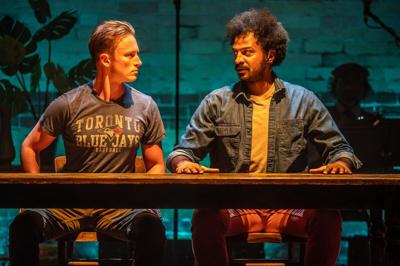King Gilgamesh and the Man of the Wild
3.5 stars out of 4
By Seth Bockley, Jesse LaVercombe, and Ahmed Moneka, directed by Bockley. Through Aug. 6 at the Young Centre for the Performing Arts, 50 Tank House Lane. or 1-416-866-8666
One of the worldÔÇÖs oldest stories gets a contemporary ╔ź╔ź└▓-set retelling in the pleasing music/theatre piece ÔÇťKing Gilgamesh and the Man of the Wild.ÔÇŁ
The show, co-produced by Soulpepper and TRIA theatres, pairs the highly charismatic creators/performers Jesse LaVercombe and Ahmed Moneka, backed by the latterÔÇÖs five-person musical ensemble Moneka Arabic Jazz. ItÔÇÖs a fictionalized version of the two menÔÇÖs real-life story of bonding on a theatre project in 2017. Here they meet in a cafe where musician/actor Ahmed works as a barista and actor Jesse waits for calls from his agent.
Both are immigrants (Ahmed from Iraq, Jesse from the U.S.), both are underemployed, and both grapple emotionally and philosophically with lifeÔÇÖs curveballs. Their experiences are also profoundly different, shaped by where they were born, their religious backgrounds and the colour of their skin.
As they get to know each other (partially aided by a shared magic mushroom trip), Ahmed brings up the Mesopotamian epic of Gilgamesh: familiar to him from his upbringing but unknown to Jesse. They start to act out the story of the legendary kingÔÇÖs friendship with the half-human Enkidu, created by the gods and sent to earth to challenge Gilgamesh and make him a better ruler. The band, led by Demetrios Petsalakis with sound design by Adrian Shepherd-Gawinski, skilfully underscores the action, sometimes joined by Ahmed on vocals and Jesse playing piano ÔÇö both are excellent musicians.
Lorenzo SavoiniÔÇÖs skilful set and lighting design maximize the stylish ambience of the Michael Young Theatre. The action mostly takes place around and on a large wooden table, framed by a rectangle of white light, with warmer lighting illuminating the exposed brick walls. The band sits behind the action with some houseplants interspersed between them, and the performers wear street clothes (no costume designer is credited). As directed by co-creator Seth Bockley, the show has a pleasingly casual, low-key vibe.
This is sometimes in contrast to the difficult experiences the men discuss. Moneka has spoken publicly of his harrowing experiences coming to Canada so we know his story is based on fact: he sought asylum here after receiving death threats from the Iraqi militia when a movie he starred in about homosexuals in Iraq gained international recognition.
LaVercombeÔÇÖs story may be true or fictionalized (or a combination), but as performed itÔÇÖs very resonant, particularly his struggles with how little control actors have over their careers (some harrowing material about his grandfather could use a more robust content warning).
Once the pattern is established that the show intertwines the mythical and present-day stories, I was on the brink of finding it predictable ÔÇö but then, things turn weirder and more fanciful in the second half, just as (the performers tell us) the epic of Gilgamesh does too. Imagined meetings mingle with seemingly real ones, and thereÔÇÖs a richly dark comic sequence about JesseÔÇÖs bit part in a big-budget American movie about the Iraq War that allows Ahmed to offer his pointed perspective on such dramatizations.
The way in which the strands of the show come together in the end to offer a message about writing oneÔÇÖs own story is resonant and satisfying. Exploring masculinity and vulnerability, the show demonstrates how creating art together can be a powerful expression of love.



























To join the conversation set a first and last name in your user profile.
Sign in or register for free to join the Conversation